Getting started with Ganache: your personal blockchain for Ethereum development
If you're developing Ethereum applications you might have noticed that it's quite annoying to develop and test your Smart Contracts using test networks like Rinkeby or Ropsten. That's mainly because you have to wait for the block to be mined and you need to have (fake) Ether in your wallet to deploy your contracts.
Until I found out about Ganache, the workflow was:
1) Write solidity code
2) Compile and deploy the contracts to the test net (~30s)
3) Copy the built contracts ABI's to my frontend repository
4) Run the frontend and test the calls to the blockchain (~30s to 2m)
That means that for testing a small change in the smart contract I'd spend nearly 3 minutes!
Not mentioning that sometimes I ran out of Ether and had to use my clicking abilities to get free (fake) money from the faucet. On the other hand, now I'm a Rinkeby rich.
Now using Ganache I dramatically reduced the time spent in this process:
1) Write solidity code
2) Compile and deploy the contracts to the local net (~2s to 5s)
3) Copy the built contracts ABI's to my frontend repository
4) Run the frontend and test the calls to the blockchain (instantaneous)
Now I can modify and test my solidity code way faster and after the new feature is ready I send it to the test net to play around with a real blockchain.
Now let's get started!
What is Ganache
If you have ever developed an Ethereum smart contract you probably heard of TestRPC. The TestRPC is a local blockchain for development purposes. It emulates the blockchain so you can make RPC calls to it without having to actually mine the blocks.
Now Ganache is like TestRPC on steroids. The amazing Truffle team developed an Electron interface where you can see and interact with your own private blockchain. And that is amazing!
Instructions
For this tutorial I'll be using the truffle-init-webpack which is a boilerplate for a dApp: a frontend bundled with webpack + a token smart contract.
1) Download and install truffle-init-webpack
Make sure you have truffle installed globally.
npm i -g truffle
Install truffle-init-webpack.
mkdir truffle-init-webpack && cd truffle-init-webpack
truffle unbox webpack
2) Run truffle-init-webpack
npm run dev
Go to your localhost:8080 and you'll see this error in the DevTools.
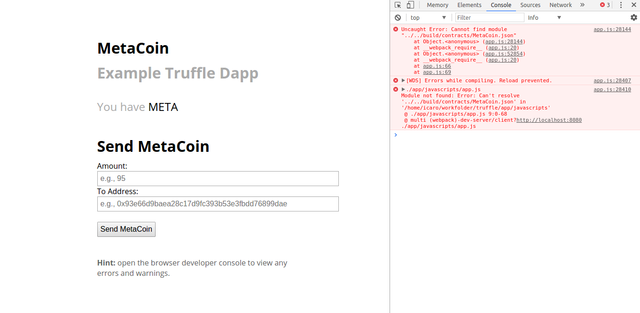
That's because we didn't compile the Smart Contracts yet. But before we do this, let's download Ganache and run our private blockchain.
3) Download and install Ganache
Go to http://truffleframework.com/ganache/ and download the app file: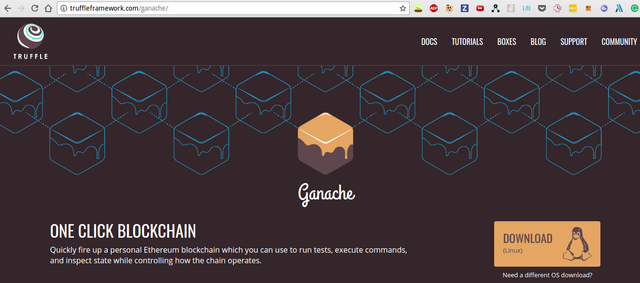
Go to your Downloads folder and run the ganache-1.0.1-x86_64.AppImage. If you're in a Unix machine you probably need to give execution permission to the file before executing it:
chmod a+x ganache-1.0.1-x86_64.AppImage
./ganache-1.0.1-x86_64.AppImage
Now you have your own blockchain running on your machine (how cool is that?).
4) Set up the network in truffle-init-webpack frontend
You'll notice that Ganache runs the private blockchain by default on http://localhost:7545, but the frontend is configured in a different port.
So open truffle.js and change line 8 to 7545.
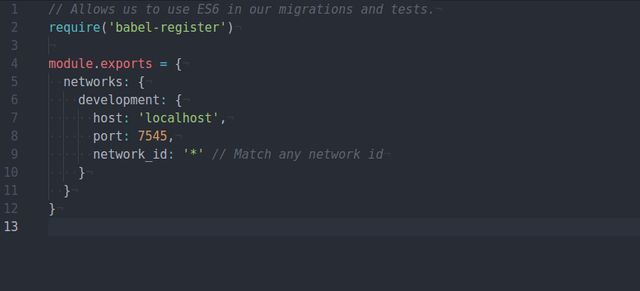
Go to app/javascripts/app.js and change line 98 to 7545 as well.

5) Compile and deploy the contracts
truffle compile
truffle migrate
Here the magic begins. If you go to Ganache, you'll see the transactions that represent your contracts being deployed! Just like etherscan.
6) Use the dApp!
Now go back to localhost:8080 and play around with the MetaCoin.
I'm sending 1000 MetaTokens to the address 0xf17f52151EbEF6C7334FAD080c5704D77216b732
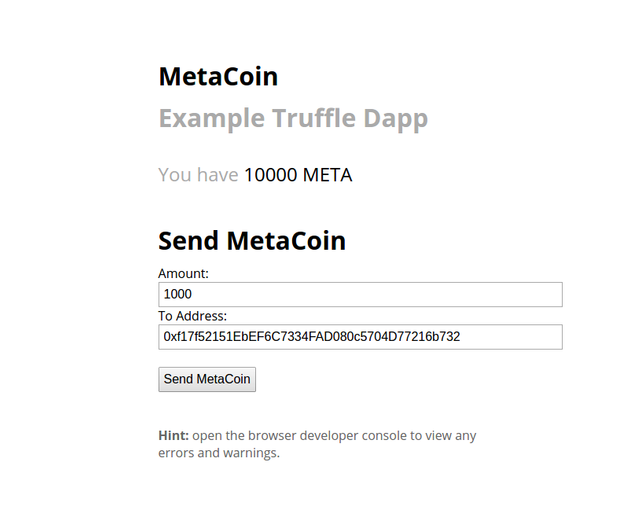
Here's the transaction:
Conclusion
In this tutorial you learned how to integrate Ganache into your workflow to develop Smart Contracts more easily. The project is very recent but it's helping me a lot, so I'd like to express my gratitude for the Truffle team!
Posted on Utopian.io - Rewarding Open Source Contributors
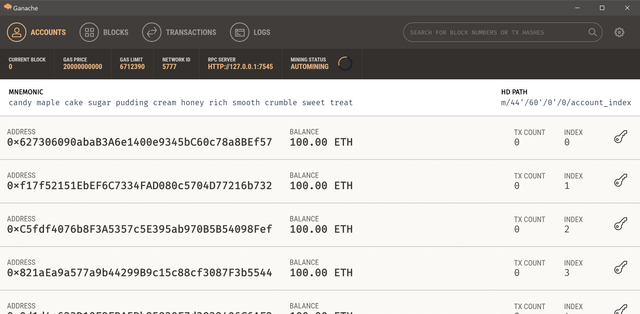
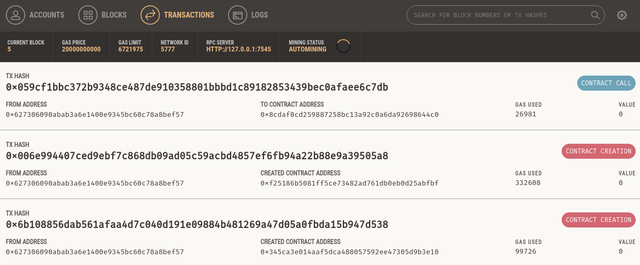
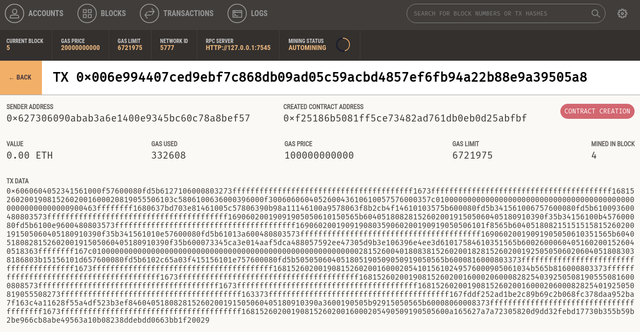
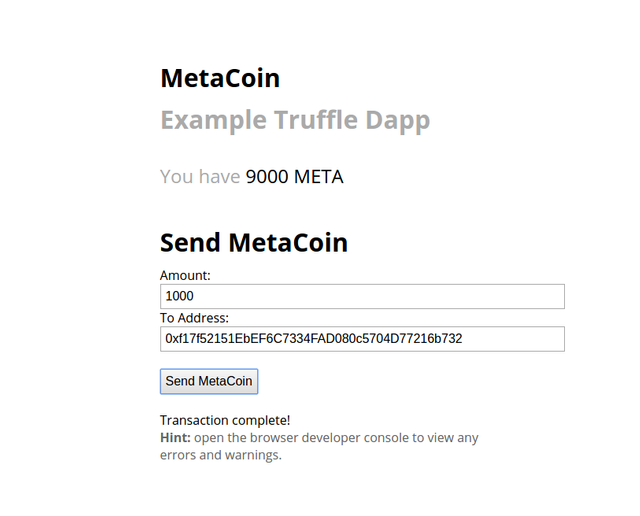
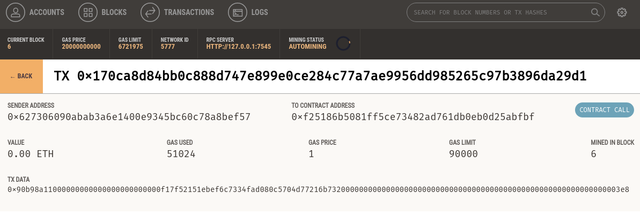
Thanks for your contribution. It has been approved.
You can contact us on Discord
[utopian-moderator]
Hey @icaro I am @utopian-io. I have just upvoted you at 7% Power!
Achievements
Suggestions
Human Curation
Community-Driven Witness!
I am the first and only Steem Community-Driven Witness. Participate on Discord. Lets GROW TOGETHER!
Up-vote this comment to grow my power and help Open Source contributions like this one. Want to chat? Join me on Discord https://discord.gg/Pc8HG9x
Congratulations @icaro! You have completed some achievement on Steemit and have been rewarded with new badge(s) :
Click on any badge to view your own Board of Honor on SteemitBoard.
For more information about SteemitBoard, click here
If you no longer want to receive notifications, reply to this comment with the word
STOPGood work
How can I view the tokens in the address that I sent it to?
Sorry, I didn't see your message earlier.
If you're using metamask, you can connect it to Ganache and the ERC20 tokens will be visible there. Also you can access the ERC20 contract methods to check for token holders